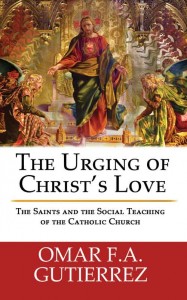Novena to St. Benedict Day 3
[powerpress]
In the Holy Rule, St. Benedict you have said:
Brothers, the Holy Scripture crys to us saying: “Every one that exalts himself shall be humbled; and he that humbles himself shall be exalted” (Lk 14:11; 18:14). Since, therefore, it says this, it shows us that every exaltation is a kind of pride…
Hence, brethren, if we wish to reach the greatest height of humility, and speedily to arrive at that heavenly exaltation to which ascent is made in the present life by humility, then, mounting by our actions, we must erect the ladder which appeared to Jacob in his dream, by means of which angels were shown to him ascending and descending (cf Gen 28:12). Without a doubt, we understand this ascending and descending to be nothing else but that we descend by pride and ascend by humility. The erected ladder, however, is our life in the present world, which, if the heart is humble, is by the Lord lifted up to heaven. For we say that our body and our soul are the two sides of this ladder; and into these sides the divine calling has inserted various degrees of humility or discipline which we must mount. . (Holy Rule 7)
Glorious Saint Benedict,
sublime model of virtue, pure vessel of God’s grace!
Behold me humbly kneeling at your feet.
I implore you in your loving kindness to pray for me before the throne of God.
To you I have recourse in the dangers that daily surround me.
Shield me against my selfishness and my indifference to God and to my neighbor.
Inspire me to imitate you in all things.
May your blessing be with me always, so that I may see and serve Christ in others and work for His kingdom.
Graciously obtain for me from God those favors and graces which I need so much in the trials, miseries and afflictions of life.
Your heart was always full of love, compassion and mercy toward those who were afflicted or troubled in any way.
You never dismissed without consolation and assistance anyone who had recourse to you.
I therefore invoke your powerful intercession, confident in the hope that you will hear my prayers and obtain for me the special grace and favor I earnestly implore.
{mention your petition}
Help me, great Saint Benedict, to live and die as a faithful child of God, to run in the sweetness of His loving will, and to attain the eternal happiness of heaven.
Amen.
O Holy Father, St. Benedict, pray for us.
Tags: catholic, catholic podcast, catholic prayer, cathollc spirituality
This entry was posted on Friday, July 4th, 2014 at 5:18 am
You can follow any responses to this entry through the RSS 2.0 feed.
Novena to St. Benedict Day 2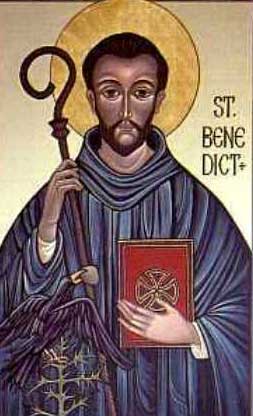
[powerpress]
In the Holy Rule, St. Benedict you have said:
What, dearest brothers, can be sweeter to us than this voice of the Lord inviting us? See, in His loving kindness, the Lord shows us the way of life. Therefore, having our loins girt with faith and the performance of good works, let us walk His ways under the guidance of the Gospel, that we may be found worthy of seeing Him who has called us to His kingdom (cf 1 Thes 2:12).
If we desire to dwell in the tabernacle of His kingdom, we cannot reach it in any way, unless we run to it by good works. But let us ask the Lord with the Prophet, saying to Him: “Lord, who shall dwell in Your tabernacle, or who shall rest in Your holy hill” (Ps 14[15]:1)? . (Holy Rule 1)
Glorious Saint Benedict,
sublime model of virtue, pure vessel of God’s grace!
Behold me humbly kneeling at your feet.
I implore you in your loving kindness to pray for me before the throne of God.
To you I have recourse in the dangers that daily surround me.
Shield me against my selfishness and my indifference to God and to my neighbor.
Inspire me to imitate you in all things.
May your blessing be with me always, so that I may see and serve Christ in others and work for His kingdom.
Graciously obtain for me from God those favors and graces which I need so much in the trials, miseries and afflictions of life.
Your heart was always full of love, compassion and mercy toward those who were afflicted or troubled in any way.
You never dismissed without consolation and assistance anyone who had recourse to you.
I therefore invoke your powerful intercession, confident in the hope that you will hear my prayers and obtain for me the special grace and favor I earnestly implore.
{mention your petition}
Help me, great Saint Benedict, to live and die as a faithful child of God, to run in the sweetness of His loving will, and to attain the eternal happiness of heaven.
Amen.
O Holy Father, St. Benedict, pray for us.
Tags: catholic, catholic podcast, catholic prayer, cathollc spirituality
This entry was posted on Thursday, July 3rd, 2014 at 6:41 am
You can follow any responses to this entry through the RSS 2.0 feed.
Novena to St. Benedict Day 1
In the Holy Rule, St. Benedict you have said:
Listen, O my son, to the precepts of the master, and incline the ear of your heart, and cheerfully receive and faithfully execute the admonitions of your loving Father, that by the toil of obedience you may return to Him from whom by the sloth of disobedience you have gone away.
To You, therefore, my speech is now directed, who, giving up your own will, take up the strong and most excellent arms of obedience, to do battle for Christ the Lord, the true King. (Holy Rule – Prologue)
Glorious Saint Benedict,
sublime model of virtue, pure vessel of God’s grace!
Behold me humbly kneeling at your feet.
I implore you in your loving kindness to pray for me before the throne of God.
To you I have recourse in the dangers that daily surround me.
Shield me against my selfishness and my indifference to God and to my neighbor.
Inspire me to imitate you in all things.
May your blessing be with me always, so that I may see and serve Christ in others and work for His kingdom.
Graciously obtain for me from God those favors and graces which I need so much in the trials, miseries and afflictions of life.
Your heart was always full of love, compassion and mercy toward those who were afflicted or troubled in any way.
You never dismissed without consolation and assistance anyone who had recourse to you.
I therefore invoke your powerful intercession, confident in the hope that you will hear my prayers and obtain for me the special grace and favor I earnestly implore.
{mention your petition}
Help me, great Saint Benedict, to live and die as a faithful child of God, to run in the sweetness of His loving will, and to attain the eternal happiness of heaven.
Amen.
O Holy Father, St. Benedict, pray for us.
Tags: catholic, catholic podcast, catholic prayer, cathollc spirituality
This entry was posted on Wednesday, July 2nd, 2014 at 6:17 am
You can follow any responses to this entry through the RSS 2.0 feed.
Episode 27- The Holy Rule of St. Benedict: A Spiritual Path for Today’s World with Fr. Mauritius Wilde O.S.B., 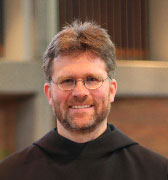 PhD.
PhD.
“To contemplate the Holy Eucharist”
[powerpress]
From the Holy Rule of St. Benedict:
PROLOGUE
Listen, O my son, to the precepts of thy master, and incline the ear of thy heart, and cheerfully receive and faithfully execute the admonitions of thy loving Father, that by the toil of obedience thou mayest return to Him from whom by the sloth of disobedience thou hast gone away.
To thee, therefore, my speech is now directed, who, giving up thine own will, takest up the strong and most excellent arms of obedience, to do battle for Christ the Lord, the true King.
In the first place, beg of Him by most earnest prayer, that He perfect whatever good thou dost begin, in order that He who hath been pleased to count us in the number of His children, need never be grieved at our evil deeds. For we ought at all times so to serve Him with the good things which He hath given us, that He may not, like an angry father, disinherit his children, nor, like a dread lord, enraged at our evil deeds, hand us over to everlasting punishment as most wicked servants, who would not follow Him to glory.
 For more information about the ministry of the the Missionary Benedictines of Christ the King Priory in Schuyler, Nebraska visit here:
For more information about the ministry of the the Missionary Benedictines of Christ the King Priory in Schuyler, Nebraska visit here:
Tags: catholic, catholic podcast, catholic prayer, cathollc spirituality, Holy Rule of St. Benedict
This entry was posted on Wednesday, May 14th, 2014 at 4:46 pm
You can follow any responses to this entry through the RSS 2.0 feed.
Dr. Matthew Bunson discusses the life, times and teachings of St. Peter Damian
-
Born: 1007, Ravenna, Italy
-
Died: February 23, 1072, Faenza, Italy
From Vatican.va, an excerpt from the teachings of Pope Benedict XVI General Audience 2009
St Peter Damian, who was essentially a man of prayer, meditation and contemplation, was also a fine theologian: his reflection on various doctrinal themes led him to important conclusions for life. Thus, for example, he expresses with clarity and liveliness the Trinitarian doctrine, already using, under the guidance of biblical and patristic texts, the three fundamental terms which were subsequently to become crucial also for the philosophy of the West: processio, relatio and persona (cf. Opusc. XXXVIII: PL CXLV, 633-642; and Opusc. II and III: ibid., 41 ff. and 58 ff). However, because theological analysis of the mystery led him to contemplate the intimate life of God and the dialogue of ineffable love between the three divine Persons, he drew ascetic conclusions from them for community life and even for relations between Latin and Greek Christians, divided on this topic. His meditation on the figure of Christ is significantly reflected in practical life, since the whole of Scripture is centred on him. The “Jews”, St Peter Damian notes, “through the pages of Sacred Scripture, bore Christ on their shoulders as it were” (Sermo XLVI, 15). Therefore Christ, he adds, must be the centre of the monk’s life: “May Christ be heard in our language, may Christ be seen in our life, may he be perceived in our hearts” (Sermo VIII, 5). Intimate union with Christ engages not only monks but all the baptized. Here we find a strong appeal for us too not to let ourselves be totally absorbed by the activities, problems and preoccupations of every day, forgetting that Jesus must truly be the centre of our life.
Communion with Christ creates among Christians a unity of love. In Letter 28, which is a brilliant ecclesiological treatise, Peter Damian develops a profound theology of the Church as communion. “Christ’s Church”, he writes, is united by the bond of charity to the point that just as she has many members so is she, mystically, entirely contained in a single member; in such a way that the whole universal Church is rightly called the one Bride of Christ in the singular, and each chosen soul, through the sacramental mystery, is considered fully Church”. This is important: not only that the whole universal Church should be united, but that the Church should be present in her totality in each one of us. Thus the service of the individual becomes “an expression of universality” (Ep 28, 9-23). However, the ideal image of “Holy Church” illustrated by Peter Damian does not correspond as he knew well to the reality of his time. For this reason he did not fear to denounce the state of corruption that existed in the monasteries and among the clergy, because, above all, of the practice of the conferral by the lay authorities of ecclesiastical offices; various Bishops and Abbots were behaving as the rulers of their subjects rather than as pastors of souls. Their moral life frequently left much to be desired. For this reason, in 1057 Peter Damian left his monastery with great reluctance and sorrow and accepted, if unwillingly, his appointment as Cardinal Bishop of Ostia. So it was that he entered fully into collaboration with the Popes in the difficult task of Church reform. He saw that to make his own contribution of helping in the work of the Church’s renewal contemplation did not suffice. He thus relinquished the beauty of the hermitage and courageously undertook numerous journeys and missions.
Because of his love for monastic life, 10 years later, in 1067, he obtained permission to return to Fonte Avellana and resigned from the Diocese of Ostia. However, the tranquillity he had longed for did not last long: two years later, he was sent to Frankfurt in an endeavour to prevent the divorce of Henry iv from his wife Bertha. And again, two years later, in 1071, he went to Monte Cassino for the consecration of the abbey church and at the beginning of 1072, to Ravenna, to re-establish peace with the local Archbishop who had supported the antipope bringing interdiction upon the city.
On the journey home to his hermitage, an unexpected illness obliged him to stop at the Benedictine Monastery of Santa Maria Vecchia Fuori Porta in Faenza, where he died in the night between 22 and 23 February 1072.
For more visit Vatican.va
Dr. Matthew Bunson, Senior Fellow of the St. Paul Center for Biblical Theology, is one of the United States’ leading authorities on the papacy and the Church.
His books include: The Encyclopedia of Catholic History; The Encyclopedia of Saints; Papal Wisdom; All Shall Be Well; Encyclopedia of the Roman Empire; and The Angelic Doctor: The Life and World of St. Thomas Aquinas; The Pope Encyclopedia; We Have a Pope! Benedict XVI, the first Catholic biography of the Holy Father in the English language; the Encyclopedia of U.S. Catholic History; Pope Francis. His also the editor of OSV’s “The Catholic Answer” magazine.
Tags: catholic, catholic podcast, catholic prayer, cathollc spirituality
This entry was posted on Tuesday, April 29th, 2014 at 8:37 am
You can follow any responses to this entry through the RSS 2.0 feed.
Episode 26- The Holy Rule of St. Benedict: A Spiritual Path for Today’s World with Fr. Mauritius Wilde O.S.B.,  PhD.
PhD.
“In place of serving self…the community meal”
[powerpress]
From the Holy Rule of St. Benedict:
CHAPTERÂ XXIV
The degree of excommunication or punishment ought to be meted out according to the gravity of the offense, and to determine that is left to the judgment of the Abbot. If, however, anyone of the brethren is detected in smaller faults, let him be debarred from eating at the common table. The following shall be the practice respecting one who is excluded from the common table: that he does not intone a psalm or an antiphon nor read a lesson in the oratory until he hath made satisfaction; let him take his meal alone, after the refection of the brethren; thus: if, for instance, the brethren take their meal at the sixth hour that brother will take his at the ninth, and if the brethren take theirs at the ninth, he will take his in the evening, until by due satisfaction he obtaineth pardon.
 For more information about the ministry of the the Missionary Benedictines of Christ the King Priory in Schuyler, Nebraska visit here:
For more information about the ministry of the the Missionary Benedictines of Christ the King Priory in Schuyler, Nebraska visit here:
Tags: catholic, catholic podcast, catholic prayer, cathollc spirituality
This entry was posted on Monday, April 28th, 2014 at 6:38 am
You can follow any responses to this entry through the RSS 2.0 feed.
Episode 25 – The Holy Rule of St. Benedict: A Spiritual Path for Today’s World with Fr. Mauritius Wilde O.S.B., PhD.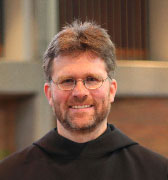
[powerpress]
From the Holy Rule of St. Benedict:
CHAPTER II
The Abbot who is worthy to be over a monastery, ought always to be mindful of what he is called, and make his works square with his name of Superior. For he is believed to hold the place of Christ in the monastery, when he is called by his name, according to the saying of the Apostle: “You have received the spirit of adoption of sons, whereby we cry Abba (Father)” (Rom 8:15). Therefore, the Abbot should never teach, prescribe, or command (which God forbid) anything contrary to the laws of the Lord; but his commands and teaching should be instilled like a leaven of divine justice into the minds of his disciples.
Let the Abbot always bear in mind that he must give an account in the dread judgment of God of both his own teaching and of the obedience of his disciples. And let the Abbot know that whatever lack of profit the master of the house shall find in the sheep, will be laid to the blame of the shepherd. On the other hand he will be blameless, if he gave all a shepherd’s care to his restless and unruly flock, and took all pains to correct their corrupt manners; so that their shepherd, acquitted at the Lord’s judgment seat, may say to the Lord with the Prophet: “I have not hid Thy justice within my heart. I have declared Thy truth and Thy salvation” (Ps 39[40]:11). “But they contemning have despised me” (Is 1:2; Ezek 20:27). Then at length eternal death will be the crushing doom of the rebellious sheep under his charge.
When, therefore, anyone taketh the name of Abbot he should govern his disciples by a twofold teaching; namely, he should show them all that is good and holy by his deeds more than by his words; explain the commandments of God to intelligent disciples by words, but show the divine precepts to the dull and simple by his works. And let him show by his actions, that whatever he teacheth his disciples as being contrary to the law of God must not be done, “lest perhaps when he hath preached to others, he himself should become a castaway” (1 Cor 9:27), and he himself committing sin, God one day say to him: “Why dost thou declare My justices, and take My covenant in thy mouth? But thou hast hated discipline, and hast cast My words behind thee” (Ps 49[50]:16-17). And: “Thou who sawest the mote in thy brother’s eye, hast not seen the beam in thine own” (Mt 7:3).
Let him make no distinction of persons in the monastery. Let him not love one more than another, unless it be one whom he findeth more exemplary in good works and obedience. Let not a free-born be preferred to a freedman, unless there be some other reasonable cause. But if from a just reason the Abbot deemeth it proper to make such a distinction, he may do so in regard to the rank of anyone whomsoever; otherwise let everyone keep his own place; for whether bond or free, we are all one in Christ (cf Gal 3:28; Eph 6:8), and we all bear an equal burden of servitude under one Lord, “for there is no respect of persons with God” (Rom 2:11). We are distinguished with Him in this respect alone, if we are found to excel others in good works and in humility. Therefore, let him have equal charity for all, and impose a uniform discipline for all according to merit.
For in his teaching the Abbot should always observe that principle of the Apostle in which he saith: “Reprove, entreat, rebuke” (2 Tm 4:2), that is, mingling gentleness with severity, as the occasion may call for, let him show the severity of the master and the loving affection of a father. He must sternly rebuke the undisciplined and restless; but he must exhort the obedient, meek, and patient to advance in virtue. But we charge him to rebuke and punish the negligent and haughty. Let him not shut his eyes to the sins of evil-doers; but on their first appearance let him do his utmost to cut them out from the root at once, mindful of the fate of Heli, the priest of Silo (cf 1 Sam 2:11-4:18). The well-disposed and those of good understanding, let him correct at the first and second admonition only with words; but let him chastise the wicked and the hard of heart, and the proud and disobedient at the very first offense with stripes and other bodily punishments, knowing that it is written: “The fool is not corrected with words” (Prov 29:19). And again: “Strike thy son with the rod, and thou shalt deliver his soul from death” (Prov 23:14).
The Abbot ought always to remember what he is and what he is called, and to know that to whom much hath been entrusted, from him much will be required; and let him understand what a difficult and arduous task he assumeth in governing souls and accommodating himself to a variety of characters. Let him so adjust and adapt himself to everyone — to one gentleness of speech, to another by reproofs, and to still another by entreaties, to each one according to his bent and understanding — that he not only suffer no loss in his flock, but may rejoice in the increase of a worthy fold.
Above all things, that the Abbot may not neglect or undervalue the welfare of the souls entrusted to him, let him not have too great a concern about fleeting, earthly, perishable things; but let him always consider that he hath undertaken the government of souls, of which he must give an account. And that he may not perhaps complain of the want of earthly means, let him remember what is written: “Seek ye first the kingdom of God and His justice, and all these things shall be added unto you” (Mt 6:33). And again: “There is no want to them that fear Him” (Ps 33[34]:10). And let him know that he who undertaketh the government of souls must prepare himself to give an account for them; and whatever the number of brethren he hath under his charge, let him be sure that on judgment day he will, without doubt, have to give an account to the Lord for all these souls, in addition to that of his own. And thus, whilst he is in constant fear of the Shepherd’s future examination about the sheep entrusted to him, and is watchful of his account for others, he is made solicitous also on his own account; and whilst by his admonitions he had administered correction to others, he is freed from his own failings.
 For more information about the ministry of the the Missionary Benedictines of Christ the King Priory in Schuyler, Nebraska visit here:
For more information about the ministry of the the Missionary Benedictines of Christ the King Priory in Schuyler, Nebraska visit here:
Tags: Holy Rule of St. Benedict, The Abbot
This entry was posted on Monday, April 21st, 2014 at 6:06 am
You can follow any responses to this entry through the RSS 2.0 feed.
Episode 24 – The Holy Rule of St. Benedict: A Spiritual Path for Today’s World with Fr. Mauritius Wilde O.S.B., PhD.
The Monk, the Missionary Spirit and Evangelization
[powerpress]
From the Holy Rule of St. Benedict:
PROLOGUE
Listen, O my son, to the precepts of thy master, and incline the ear of thy heart, and cheerfully receive and faithfully execute the admonitions of thy loving Father, that by the toil of obedience thou mayest return to Him from whom by the sloth of disobedience thou hast gone away.
To thee, therefore, my speech is now directed, who, giving up thine own will, takest up the strong and most excellent arms of obedience, to do battle for Christ the Lord, the true King.
 For more information about the ministry of the the Missionary Benedictines of Christ the King Priory in Schuyler, Nebraska visit here:
For more information about the ministry of the the Missionary Benedictines of Christ the King Priory in Schuyler, Nebraska visit here:
Tags: evangelization, Holy Rule of St. Benedict
This entry was posted on Thursday, April 17th, 2014 at 4:53 pm
You can follow any responses to this entry through the RSS 2.0 feed.
Episode 39- Regnum Novum: Bringing forth the New Evangelization through Catholic Social Teaching with Omar Gutierrez  – We continue the study of the “Compendium of the Social Doctrine of the Church” Â Chapter 12 “Social Doctrine and Ecclesial Action”
– We continue the study of the “Compendium of the Social Doctrine of the Church” Â Chapter 12 “Social Doctrine and Ecclesial Action”
[powerpress]
CHAPTER TWELVE
SOCIAL DOCTRINE AND ECCLESIAL ACTION
I. PASTORAL ACTION IN THE SOCIAL FIELD
a. Social doctrine and the inculturation of faith
b. Social doctrine and social pastoral activity
c. Social doctrine and formation
d. Promoting dialogue
e. The subjects of social pastoral activity
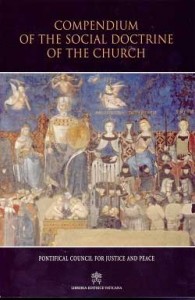
We live at a very special time. The confluence of many things has brought forth the clear need to be able to articulate the Social Teaching of the Catholic Church in a way that is accessible and applicable. This is not to be an effort where high-minded theories are to be bandied about. Rather, this is a time of opportunity wherein we can apply the Social Doctrine to the concrete so as to bring about a New Kingdom, a Revolution. – Omar G.
Also visit Omar’s “Discerning Hearts” page Catholic Social Teaching 101
You can find Omar Gutierrez’s book here
In The Urging of Christ’s Love Omar Gutiérrez tells the stories of eleven people who lived their lives in pursuit of Christ Jesus. Each Saint, Blessed or Servant of God is considered in the context of Catholic Social Teaching. Then at the end of each chapter a prayer is offered and quotes from the Compendium of the Social Doctrine of the Church are provided in order to link the lessons we can learn from the saint’s life to Church teaching. By discovering some new saint friends, and rediscovering some old ones, The Urging of Christ’s Love presents Catholic Social Teaching in an accessible and important way.
Tags: catholic, catholic podcast, catholic prayer
This entry was posted on Monday, April 14th, 2014 at 3:45 pm
You can follow any responses to this entry through the RSS 2.0 feed.
Episode 23 – The Holy Rule of St. Benedict: A Spiritual Path for Today’s World with Fr. Mauritius Wilde O.S.B., PhD.
Prayer during the Night
[powerpress]
From the Holy Rule of St. Benedict:
CHAPTER 8
Of the Divine Office during the Night
Making due allowance for circumstances, the brethren will rise during the winter season, that is, from the calends of November till Easter, at the eighth hour of the night; so that, having rested till a little after midnight, they may rise refreshed. The time, however, which remains over after the night office (Matins) will be employed in study by those of the brethren who still have some parts of the psalms and the lessons to learn.
But from Easter to the aforesaid calends, let the hour for celebrating the night office (Matins) be so arranged, that after a very short interval, during which the brethren may go out for the necessities of nature, the morning office (Lauds), which is to be said at the break of day, may follow presently.
Father Mauritius Wilde, OSB, Ph.D., did his philosophical, theological and doctoral studies in Europe. He is the author of several books and directs retreats regularly. He serves as Prior of our monastery in Schuyler.
 For more information about the ministry of the the Missionary Benedictines of Christ the King Priory in Schuyler, Nebraska visit here:
For more information about the ministry of the the Missionary Benedictines of Christ the King Priory in Schuyler, Nebraska visit here:
Tags: Holy Rule of St. Benedict, Mauritius
This entry was posted on Tuesday, April 8th, 2014 at 2:17 pm
You can follow any responses to this entry through the RSS 2.0 feed.
Episode 22 – The Holy Rule of St. Benedict: A Spiritual Path for Today’s World with Fr. Mauritius Wilde O.S.B., PhD.
On Suffering
[powerpress]
From the Holy Rule of St. Benedict:
CHAPTER 7
an excerpt:
The fourth degree of humility is, that, if hard and distasteful things are commanded, nay, even though injuries are inflicted, he accept them with patience and even temper, and not grow weary or give up, but hold out, as the Scripture saith: “He that shall persevere unto the end shall be saved” (Mt 10:22). And again: “Let thy heart take courage, and wait thou for the Lord” (Ps 26[27]:14). And showing that a faithful man ought even to bear every disagreeable thing for the Lord, it saith in the person of the suffering: “For Thy sake we suffer death all the day long; we are counted as sheep for the slaughter” (Rom 8:36; Ps 43[44]:22). And secure in the hope of the divine reward, they go on joyfully, saying: “But in all these things we overcome because of Him that hath loved us” (Rom 8:37). And likewise in another place the Scripture saith: “Thou, O God, hast proved us; Thou hast tried us by fire as silver is tried; Thou hast brought us into a net, Thou hast laid afflictions on our back” (Ps 65[66]:10-11). And to show us that we ought to be under a Superior, it continueth, saying: “Thou hast set men over our heads” (Ps 65[66]:12). And fulfilling the command of the Lord by patience also in adversities and injuries, when struck on the one cheek they turn also the other; the despoiler of their coat they give their cloak also; and when forced to go one mile they go two (cf Mt 5:39-41); with the Apostle Paul they bear with false brethren and “bless those who curse them” (2 Cor 11:26; 1 Cor 4:12).
Father Mauritius Wilde, OSB, Ph.D., did his philosophical, theological and doctoral studies in Europe. He is the author of several books and directs retreats regularly. He serves as Prior of our monastery in Schuyler.
 For more information about the ministry of the the Missionary Benedictines of Christ the King Priory in Schuyler, Nebraska visit here:
For more information about the ministry of the the Missionary Benedictines of Christ the King Priory in Schuyler, Nebraska visit here:
Tags: Holy Rule of St. Benedict
This entry was posted on Wednesday, March 26th, 2014 at 12:11 am
You can follow any responses to this entry through the RSS 2.0 feed.
Episode 21 – The Holy Rule of St. Benedict: A Spiritual Path for Today’s World with Fr. Mauritius Wilde O.S.B., PhD.
Fighting the Demons
[powerpress]
From the Holy Rule of St. Benedict:
CHAPTER I
an excerpt:
The second kind is that of Anchorites, or Hermits, that is, of those who, no longer in the first fervor of their conversion, but taught by long monastic practice and the help of many brethren, have already learned to fight against the devil; and going forth from the rank of their brethren well trained for single combat in the desert, they are able, with the help of God, to cope single-handed without the help of others, against the vices of the flesh and evil thoughts.
Special note: Â Fr. Mauritus speaks of a book by Evagrius of Pontus, the link is below :
Evagrius Of Pontus: Talking Back: A Monastic Handbook for Combating Demons (Cistercian Studies)
Father Mauritius Wilde, OSB, Ph.D., did his philosophical, theological and doctoral studies in Europe. He is the author of several books and directs retreats regularly. He serves as Prior of our monastery in Schuyler.
 For more information about the ministry of the the Missionary Benedictines of Christ the King Priory in Schuyler, Nebraska visit here:
For more information about the ministry of the the Missionary Benedictines of Christ the King Priory in Schuyler, Nebraska visit here:
Tags: Fr, Holy Rule of St. Benedict, Mauritius
This entry was posted on Friday, March 14th, 2014 at 4:13 pm
You can follow any responses to this entry through the RSS 2.0 feed.
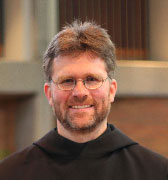 Episode 20- The Holy Rule of St. Benedict: A Spiritual Path for Today’s World with Fr. Mauritius Wilde O.S.B., PhD.
Episode 20- The Holy Rule of St. Benedict: A Spiritual Path for Today’s World with Fr. Mauritius Wilde O.S.B., PhD.
[powerpress]
In this episode, Fr. Maurtius is joined by his fellow Missionary Benedictines, Sr. Fidelis Marie Lanowich  and Sr. Gabriel Mary Oestreich of the Immaculata Monastery, Norfolk, NE and Br. Damian Cayetano of Christ the King Priory, Schuyler, NE. The group discusses what drew them to the Holy Rule of St. Benedict. They share their response to the Holy Rule and it’s guidance for their lives. The subject is obedience and balance is part of the conversation, as well as the importance of community.
and Sr. Gabriel Mary Oestreich of the Immaculata Monastery, Norfolk, NE and Br. Damian Cayetano of Christ the King Priory, Schuyler, NE. The group discusses what drew them to the Holy Rule of St. Benedict. They share their response to the Holy Rule and it’s guidance for their lives. The subject is obedience and balance is part of the conversation, as well as the importance of community.
Father Mauritius Wilde, OSB, Ph.D., did his philosophical, theological and doctoral studies in Europe. He is the author of several books and directs retreats regularly. He serves as Prior of our monastery in Schuyler.
 For more information about the ministry of the the Missionary Benedictines of Christ the King Priory in Schuyler, Nebraska visit here:
For more information about the ministry of the the Missionary Benedictines of Christ the King Priory in Schuyler, Nebraska visit here:
Tags: Gabriel Mary Oestreich, Holy Rule of St. Benedict, Missionary Benedictines
This entry was posted on Wednesday, February 26th, 2014 at 8:18 pm
You can follow any responses to this entry through the RSS 2.0 feed.
 Episode 19 – The Holy Rule of St. Benedict: A Spiritual Path for Today’s World with Fr. Mauritius Wilde O.S.B., PhD.
Episode 19 – The Holy Rule of St. Benedict: A Spiritual Path for Today’s World with Fr. Mauritius Wilde O.S.B., PhD.
[powerpress]
In this episode, Fr. Maurtius is joined by his fellow Missionary Benedictines,  Sr. Fidelis Marie Lanowich  and Sr. Gabriel Mary Oestreich of the Immaculata Monastery, Norfolk, NE and Br. Damian Cayetano of Christ the King Priory, Schuyler, NE.  The group  discusses what drew them to the Holy Rule of St. Benedict.  They share their discernment process concerning their vocational call, the response of family and friends.  They discuss the experience of finding “home” within the life of their communities.
and Sr. Gabriel Mary Oestreich of the Immaculata Monastery, Norfolk, NE and Br. Damian Cayetano of Christ the King Priory, Schuyler, NE.  The group  discusses what drew them to the Holy Rule of St. Benedict.  They share their discernment process concerning their vocational call, the response of family and friends.  They discuss the experience of finding “home” within the life of their communities.
Father Mauritius Wilde, OSB, Ph.D., did his philosophical, theological and doctoral studies in Europe. He is the author of several books and directs retreats regularly. He serves as Prior of our monastery in Schuyler.
 For more information about the ministry of the the Missionary Benedictines of Christ the King Priory in Schuyler, Nebraska visit here:
For more information about the ministry of the the Missionary Benedictines of Christ the King Priory in Schuyler, Nebraska visit here:
Tags: Holy Rule of St. Benedict, Missionary Benedictines
This entry was posted on Thursday, February 20th, 2014 at 2:17 pm
You can follow any responses to this entry through the RSS 2.0 feed.
Episode 18 – The Holy Rule of St. Benedict: A Spiritual Path for Today’s World with Fr. Mauritius Wilde O.S.B., PhD.
Listening to God’s Voice…Obedience
[powerpress]
From the Holy Rule of St. Benedict:
CHAPTER V
Of ObedienceThe first degree of humility is obedience without delay. This becometh those who, on account of the holy subjection which they have promised, or of the fear of hell, or the glory of life everlasting, hold nothing dearer than Christ. As soon as anything hath been commanded by the Superior they permit no delay in the execution, as if the matter had been commanded by God Himself. Of these the Lord saith: “At the hearing of the ear he hath obeyed Me” (Ps 17[18]:45). And again He saith to the teachers: “He that heareth you heareth Me” (Lk 10:16).Such as these, therefore, instantly quitting their own work and giving up their own will, with hands disengaged, and leaving unfinished what they were doing, follow up, with the ready step of obedience, the work of command with deeds; and thus, as if in the same moment, both matters — the master’s command and the disciple’s finished work — are, in the swiftness of the fear of God, speedily finished together, whereunto the desire of advancing to eternal life urgeth them. They, therefore, seize upon the narrow way whereof the Lord saith: “Narrow is the way which leadeth to life” (Mt 7:14), so that, not living according to their own desires and pleasures but walking according to the judgment and will of another, they live in monasteries, and desire an Abbot to be over them. Such as these truly live up to the maxim of the Lord in which He saith: “I came not to do My own will, but the will of Him that sent Me” (Jn 6:38).This obedience, however, will be acceptable to God and agreeable to men then only, if what is commanded is done without hesitation, delay, lukewarmness, grumbling or complaint, because the obedience which is rendered to Superiors is rendered to God. For He Himself hath said: “He that heareth you heareth Me” (Lk 10:16). And it must be rendered by the disciples with a good will, “for the Lord loveth a cheerful giver (2 Cor 9:7). ” For if the disciple obeyeth with an ill will, and murmureth, not only with lips but also in his heart, even though he fulfil the command, yet it will not be acceptable to God, who regardeth the heart of the murmurer. And for such an action he acquireth no reward; rather he incurreth the penalty of murmurers, unless he maketh satisfactory amendment.
Father Mauritius Wilde, OSB, Ph.D., did his philosophical, theological and doctoral studies in Europe. He is the author of several books and directs retreats regularly. He serves as Prior of our monastery in Schuyler.
 For more information about the ministry of the the Missionary Benedictines of Christ the King Priory in Schuyler, Nebraska visit here:
For more information about the ministry of the the Missionary Benedictines of Christ the King Priory in Schuyler, Nebraska visit here:
Tags: catholic, catholic podcast, catholic prayer
This entry was posted on Monday, February 3rd, 2014 at 10:30 am
You can follow any responses to this entry through the RSS 2.0 feed.





